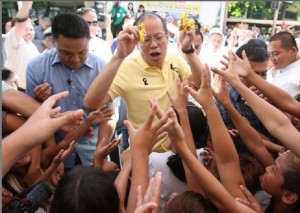
President Benigno S. Aquino III asks children to wait as he distributes baller IDs to them in Apolinario Mabini Elementary School in Barangay 391, Quiapo, Manila after the 2012 Brigada Eskwela event. LYN RILLON
President Benigno Aquino III on Thursday attended the Brigada Eskwela 2012 kick-off at Apolinario Mabini Elementary School in Quiapo, Manila, where he thanked parents, teachers and other stakeholders for taking part in the annual cleanup.
The Department of Education (DepEd) has said that beginning this year it is putting a premium on sanitation and hygiene through Brigada Eskwela, the weeklong school repair and community cleanup activity in preparation for the opening of classes in public schools.
Some 21 million students will troop to public elementary and high schools on June 4. An estimated three million more will be going to private schools, which have separate class-opening schedules.
“This afternoon, let us all feel the spirit of bayanihan through Brigada Eskwela 2012. With this activity, an estimated 45,000 public schools from every corner of the country are with us in contributing to society,” said Mr. Aquino in his speech.
He warned his audience that they would have more classrooms to clean in the coming years as the government and the private sector are building more to address the shortage of schoolbuildings in the country.
He said the government had increased its spending for education “because this is where the long-term growth of countries start.”
He said that from just P175 billion in 2010, the Aquino administration increased education’s allocation in the national budget to P207.3 billion in 2011.
“And because we don’t want to fall short in 2012, we further increased the funds for basic education this year to P238.8 billion,” Mr. Aquino said.
He said the government expected to wipe out the 60,000-classroom shortfall by 2013.
“[Aside] from the more than 10,000 classrooms that we have already built, there are an estimated 30,000 classrooms more that we will build this year with the participation of various sectors,” he said.
Partners with Unicef
“If the partnership between the private sector and the government continues, by 2013 every student will get a quality education inside a quality classroom,” he said.
“This also means that in the next school year we’d need more participants in the Brigada Eskwela because we’d have more classrooms to clean,” he said.
The nine-year-old Brigada Eskwela program is partnering for the first time this year with the United Nations Children’s Fund (Unicef) for the provision of free handwashing facilities in the schools.
In a speech at the Brigada Eskwela 2012 kick-off at Justo Lukban Elementary School in Paco, Manila, on Monday, Unicef country representative Tomoo Hozumi noted that in the Philippines, two out of three elementary pupils suffered from intestinal worms, nine out of 10 from dental caries, and that one of the most common stomach complaints was diarrhea.
“All can be prevented through access to safe water, clean toilets and handwashing facilities,” Hozumi said.
Education Secretary Armin Luistro said in his speech that this year’s education budget is addressing the “lack of teachers, classrooms and sanitation facilities.”
He appealed for donations, saying there was a need not just for construction and cleaning supplies and labor, but also for roofing material, pipes and toilet bowls.
Hozumi noted that more than 50 students share one toilet in elementary schools and almost 100 students share one toilet in secondary schools.
The Justo Lukban Elementary School has only 70 classrooms and 12 toilets for 2,871 students from kindergarten to sixth grade. Each rest room has around six toilets, said school principal Vecelina Tan.
The Unicef and the World Health Organization recommend at most only 25 students to one toilet, Hozumi said.
According to Unicef Philippines WASH (Water, Sanitation and Hygiene) in Schools officer Jon Michael Villasenor, even before the partnership with Brigada Eskwela, the Unicef had been implementing the WASH in School program in 10 school divisions nationwide, installing handwashing facilities, toilets and a clean water supply. With a report from Tarra Quismundo